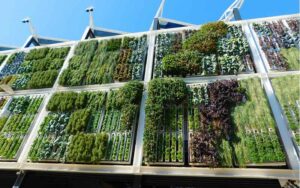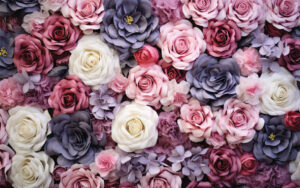Mulching as Water Saving Technique in Urban Landscaping
Dr. M. K. Sharma, Assistant Professor (Horticulture), Sardarkrushiagar Datiwada Agricultural University, Gujarat
Ms. Vasoya, D.K, PG- Floriculture and landscaping, Sardarkrushiagar Datiwada Agricultural University, Gujarat
Ms. Patel P.N.
PG- Floriculture and landscaping, Sardarkrushiagar Datiwada Agricultural University, Gujarat
Water resources for landscape gardening have been limited over the years due to rapid urbanization, improved living standards, limited development of new water supplies, and dwindling current water supplies in the urban and semi-urban areas. Not surprisingly, one reaction to the looming water crisis has been increased scrutiny of how, and for what purposes, water is being used during upcoming hot summer. To mitigate the water stress in gardens, mulching has a crucial impact as a water saving technique in landscaping. It is important mainly for conserving soil moisture, relegating soil temperature, and limiting soil evaporation, which affect the ornamental plants. Mulching has many strategic effects on rootzone ecosystem, plant growth and microclimate. Mulch insulates the soil, helping to provide a buffer from cold and hot temperature that have a crucial activity in creating beautiful and protected landscape. The purpose of this paper is to summarize the information about both organic and plastic mulch materials, applicability and its impact the efficient use of water in the urban landscape.
INTRODUCTION
Water use has been increasing globally by roughly 1% per year over the last 40 years and is expected to grow at a similar rate through to 2050, driven by a combination of population growth, socio-economic development and changing consumption patterns. According to the latest figures from 2020, 26% of the world’s population (2 billion people) did not have access to safely managed drinking water services and an estimated 46% (3.6 billion) lacked access to safely managed sanitation. (The United Nations World Water Development Report, 2023). While urban water demand is projected to increase by 80% by 2050, water allocation from agriculture to urban centres has become a common strategy to meet freshwater needs in growing cities. In India, cities as are generators of wealth and employment, incubators of innovation and creativity, and provide the best opportunities to improve livelihoods, but cities themselves are not just home to the prosperous. The current performance of India’s cities is poor across key indicators of quality of life. India’s cities fall well short of delivering even the basic standards of living for their residents including water supply and park and open space. The availability of per capita water for urban user is only 105 litres/day, which is below to the basic service standard (150 litres/capita/day), while, the available open space and park is merely 2.7 square meter per capita, which is very low than the basic service standard (9.0 m2/capita) for urban inhabitants. The enhancement of urban green landscape with water efficient practices is one of the ways, which has the potential to mitigate the adverse effects of urbanization in a sustainable manner, improved human use of land making cities more attractive and comfortable to live in. Therefore, conservation of soil moisture by using mulching may be an efficient option to save urban water as well as rising green landscape area.
Mulching is the technique of covering of the soil/ground surface around the plants with a mineral, organic or synthetic mulch to create more favourable condition for the plant growth and to optimise water use. It establishes a linkage between soil and agro-meteorology which can modify the plant microclimate. Mulch is defined as any covering material including a mineral, organic or inorganic applied on the soil surface. There are two types of mulches i.e., organic or biodegradable made of organic materials and inorganic mainly made of plastic-based materials. These both are being popularised in recent years. Although it is still contradictory which one is best in landscape gardening?
Benefits of mulching
- Mulch is considered a water conservator as it provides a barrier against soil-moisture loss resulting in fewer watering sessions for ornamentals.
- Promotes the healthy growth by suppressing weeds and reduces incidence of pest and diseases.
- Organic mulches works as a nutrient supplier for healthy growth of plants. It also activates the soil microflora and microorganisms, which improves soil texture by increasing aeration.
- Mulches give a clean appearance by hiding the soil. Decorative mulches makes garden aesthetically appealing.
- Mulch covers the soil surface and discourage pets from the digging of soil.
- Mulch regulates the soil temperature and protects plant roots from direct sun exposure.
- Keep soil from splashing outwhen watering plants.
In landscape gardening, mulching should be decorative and beneficial for plant’s health, depending on the type used. Mulching helps prevent moisture loss caused by dry indoor or outdoor conditions. In addition, natural mulches decompose slowly, providing additional nutrients into the soil which are vital to plant’s health. The selection of an appropriate mulching material depends on the types of materials, ecological locations, colours, thickness, perforations and availability of materials, cost-effectiveness and feasibility.
| Mulches used in Landscape Gardening | ||
| Decorative stones or
gravel |
: | It includes gravel, clay pellets, peat, slate, crushed stone, pebbles, etc. These stones are lightweight and, aid in moisture retention and can be bought in various colours and sizes and provide the perfect splash of colour to soil surface. |
| Sand | Coral sand, glass sand, immature sand, corase sand, gypsum sand, etc. can be used as mulch material. These increases the aesthetics of the garden by contrasting the foliage colour of the plants with white background. It improves the soil drainage and aeration and also restricts weed growth. | |
| Marbles | : | It adds a range of colours and fun to gardens and looks great when arranged in patterns, and they help to reduce moisture loss. |
| Glass mulch | : | Lightweight, non-degradable glass mulch or recycled coloured glass is available in many shades and has no sharp edges, making it the perfect mulch topping to container plants and even for outdoors gardening. Moreover it prevents moisture loss. |
| Living mulch | : | Tiny groundcovers like dwarf sedium or living mosses, etc. |
| Organic mulch | : | Bio-based cellulose, wood chips, nut shells, sphagnum moss, leaf, paper, hay, well-rotted manure, pine needles, Coco coir, compost, newspapers and grass clippings. etc. are common natural mulch materials. They are degradable to soil, improve water infiltration and provide additional nutritional benefits to the growing plants. In general organic mulch are cheaper and easily available. |
| Plastic Mulch | : | Plastic mulch are Acetate, polyethylene, polymeric materials having longer durability. They are available in 15–20 μm thickness and black, silver, white, red, blue, yellow, etc. colour. Plastic mulches permits solarisation most effectively by boosting soil temperature and reduces insect pest and weeds. It restricts water infiltration in soil. |
Mulching is a water preserving technique in garden and landscape areas for conserving soil moisture, regulating temperature and reducing soil erosion. The main strength of mulching is to conserve soil moisture by reducing soil evaporation and controlling soil erosion. Basically mulching conserves soil water by reducing soil evaporation and regulating soil temperature which decrease irrigation demand for growing ornamentals plants. Soil water and heat transfer mechanism under the mulching is important to increase the availability of the system for efficient use of mulching. It is still researchable that what amount of water saved by mulching which is critical due to interaction of microclimate, soil environment and plant growths.
















